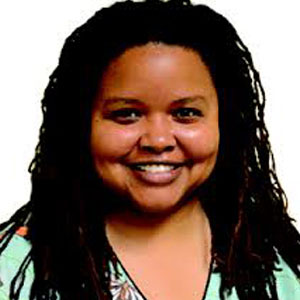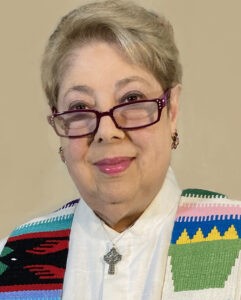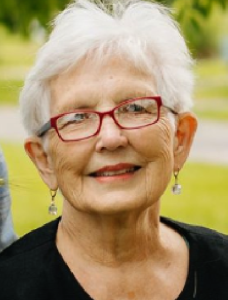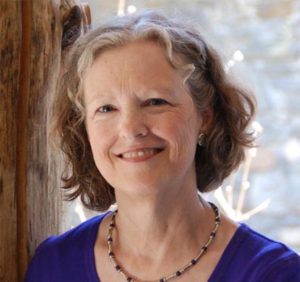A new collection of essays by women in ministry illustrates the passion and determination women have mustered in overcoming the barriers they faced in answering their callings.
“We wanted to hear the honest stories of a woman’s call to ministry, what was bad about it and what was good about it. We wanted to hear the struggles, but also the joys,” said Kathy Manis Findley, co-editor with Kay Wilson Shurden of When God Whispered My Name: Stories of Journey Told by Baptist Women Called to Ministry.

Anika Whitfield
Anika T. Whitfield’s story, like the other 18 presented in the book, illustrates the grit women in ministry have had to muster to follow the calling of the Spirit.
Whitfield was ordained at New Millennium Baptist Church in Little Rock, Ark., in 2012, nearly a decade after a combative and painful ministry licensing experience in an African Methodist Episcopal congregation.
“I was questioned time and time again about my loyalty to the pastor, to the discipline and to the doctrine of the AME Church,” writes Whitfield, who currently serves as assistant minister and minister to youth at the Church Without Walls Global Reach Ministries in Mt. Rainier, Md.
“Surprised by the questions about my integrity and my commitment to a discipline and doctrine, rather than an opportunity to acknowledge my gifts and to offer support as I used them, I found myself repetitively asking how any of these questions lined up with God’s word or with God’s specific calling in my life,” she recalls.
The experience led her to seek ministry opportunities — and the joy that comes with them — in more accepting spaces, including the Cooperative Baptist Fellowship and the Progressive National Baptist Convention. “I now live in my sacred place of call, preaching and teaching, caring and loving, creating beloved community, and working for social justice,” she says.

Kathy Manis Findley

Kay Shurden
Neither Manis Findley nor Shurden are strangers to the struggles described in God Whispered My Name. Manis Findley is an ordained minister who has served as a pastor and chaplain, and Shurden answered her calling through teaching.
The accounts they present span five generations of female minsters, Manis Findley said. “We wanted to look at ministries that were ongoing, recent and far in the past. It’s a historical chronicle with at least two or more people in their 70s and one or two who are in their 20s. Bill Leonard was asked to write the foreword to put the book in historical context.”
Leonard, founding dean and professor emeritus of Wake Forest University School of Divinity, also places the writers in their Baptist contexts.
“While not all of them continue to serve within Baptist congregations, each of them has some element of a ‘Baptist past’ that both nurtured and distanced itself from their calling to ministry. Their stories bear witness to the gifts of spiritual formation they received in Baptist traditions and the testimony that each of them brings inside and outside those traditions,” Leonard writes in his foreword titled, “On Spirit-Infused Callings.”
 “Concerning the participation of women in ordained Christian ministry, Baptists have often tried to have it both ways,” he explains. “They nurtured girls and boys with a calling to commit their lives to Jesus Christ for salvation, discipleship and mission … yet when some of those women took them at their word, experienced ‘the call’ to Christian ministry, and had the audacity to seek ordination, Baptists cut theological bait on them.”
“Concerning the participation of women in ordained Christian ministry, Baptists have often tried to have it both ways,” he explains. “They nurtured girls and boys with a calling to commit their lives to Jesus Christ for salvation, discipleship and mission … yet when some of those women took them at their word, experienced ‘the call’ to Christian ministry, and had the audacity to seek ordination, Baptists cut theological bait on them.”
When God Whispered My Name also presents culturally and ministerially diverse voices. Writers come from a range of racial, geographic, international and denominational perspectives and serve as lead pastors, music ministers, chaplains and other callings.
Yet, they all share at least one essential quality, Shurden added. “These women have taken their gifts and gone into the world when the church would not allow them onto the easy path. Through it all, they have made the world a richer place, and they have made the church a richer place.”
In her essay, Nancy Hastings Sehested describes her uphill path to the pastorate beginning by hearing women preach in the Texas Baptist church of her youth.
“My trouble began when I walked one flight up and spoke from the pulpit sanctuary. Location. Location. Location.”
“Those preaching women were called missionaries, with their messages named ‘talks’ or ‘testimonies’ instead of sermons. They spoke in the fellowship hall in the basement rather than upstairs in the sanctuary. My trouble began when I walked one flight up and spoke from the pulpit sanctuary. Location. Location. Location.”

Nancy Hastings Sehested
By the late 1980s, Sehested was serving as pastor of a Baptist church in Tennessee, which was cut loose from its association for calling her.
“The disfellowshipping act was yet another way to control and oppress women. It was yet another indication of the abuse of power,” she writes. “The action was wrapped in the language of biblical authority. It was a thin veneer. It was an act of justifying the subjugation and submission of women.”
But Sehested, who also served churches in Georgia and North Carolina during a 25-year span, expresses gratitude in her essay for the accomplishments of women in ministry. “Women have expanded the conversation in theology, prophetically calling us all to see both the injustices as well as the redemption in our religious traditions.”
Manis Findley said she and Shurden hope “first of all” that girls and young women will be inspired by the writers in the book. “It’s especially important that women and girls considering a call to ministry, or who may grow up to consider a call to ministry, read these stories.”
Baptists are another intended audience, she added. “We wanted them to know this struggle exists because of them. We wanted it to be enlightening for churches.”
Related articles:
Women in ministry: Strategically silent? | Analysis by Melody Maxwell
The untold story of Black women leaders in the Civil Rights Movement | Opinion by Marvin McMickle
Book traces the complex story of women’s influence within Southern Baptist Convention


